
Sailing Magne
25 June 2014
24 June 2014 | Tahaa
24 June 2014 | Tahaa
21 June 2014 | Rangiroa
21 June 2014
21 June 2014
16 June 2014 | Rangiroa, South East sector
13 June 2014 | Rangiroa, South sector
07 June 2014 | Apataki
06 June 2014 | Apataki, Tamaro Motu
06 June 2014
05 June 2014
05 June 2014
02 June 2014 | Apataki, Rua Vahine Motu
30 May 2014 | Toau, Anse Amyot
28 May 2014 | Kauehi, Tearavero village
24 May 2014 | Kauehi, Tearavero village
22 May 2014 | Kauehi, Mahuehue Motu
22 May 2014 | Kauehi, Mahuehue Motu
19 May 2014 | Fakarava, Pink Sands, South Pass
Bye for now!
25 June 2014
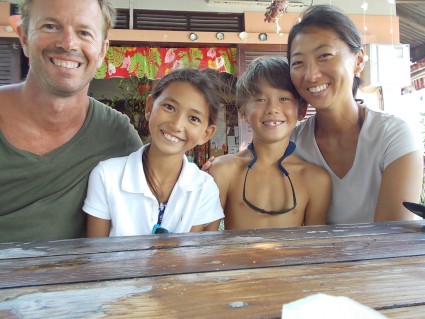
We'll be back
A memorable trip!
24 June 2014 | Tahaa
Zach
I was so excited to leave London not knowing the treasured land that lay ahead. I was clueless of what I was to discover.
When we arrived I wondered when we were going to go in the rough seas for I thought we were going to stay in the Pacific ocean for 3 months. The heat stunned me and my body sweated profusely.
When we got in the taxi, the driver, a very nice lady, gave us a flower necklace and a cold water bottle(which had probably saved me of dying of heat) and immediately I thought everybody in the country was like that.
The activities I did were canoeing, swimming, paddle board, and I especially liked snorkelling, fishing, beach football and beach combing with my mum.
The coconut crabs, I remember them because of their claws that can slice off fingers, the heart of palm trees, and learning to fish. My most memorable moment was the one week with the kids of Kauehi. I think that valine tane was one of the funniest stories. I believe there was nothing I disliked in this trip
I learnt how to sail a catamaran, how to identify poisonous or dangerous objects and animals and different food. I discovered most importantly how the people lived not needing much money to survive because they have coconuts, crabs, crayfish, an enormous kind of sea snails which I found very tasty, fishes and many other sea creatures.
This trip will stay in my heart forever and I'm sure I will be coming back with my own family or hopefully before.
When we arrived I wondered when we were going to go in the rough seas for I thought we were going to stay in the Pacific ocean for 3 months. The heat stunned me and my body sweated profusely.
When we got in the taxi, the driver, a very nice lady, gave us a flower necklace and a cold water bottle(which had probably saved me of dying of heat) and immediately I thought everybody in the country was like that.
The activities I did were canoeing, swimming, paddle board, and I especially liked snorkelling, fishing, beach football and beach combing with my mum.
The coconut crabs, I remember them because of their claws that can slice off fingers, the heart of palm trees, and learning to fish. My most memorable moment was the one week with the kids of Kauehi. I think that valine tane was one of the funniest stories. I believe there was nothing I disliked in this trip
I learnt how to sail a catamaran, how to identify poisonous or dangerous objects and animals and different food. I discovered most importantly how the people lived not needing much money to survive because they have coconuts, crabs, crayfish, an enormous kind of sea snails which I found very tasty, fishes and many other sea creatures.
This trip will stay in my heart forever and I'm sure I will be coming back with my own family or hopefully before.
The beginning of the end
24 June 2014 | Tahaa
Raphaelle
At the beginning of the trip, I felt very sad about leaving London, my friends, school or any society of children. Now that this trip is coming to an end, I think that time has whisked by, but I'm glad to be coming home.
My expectations of the trip were based on imagination, mostly, yet our parents had told us a lot. I expected the atolls to be more isolated, and therefore less boats. On the contrary, the Tuamotus are a stop for all the boats that have crossed the Pacific from the Americas, when I mean a lot of boats, I mean a range between 0 to 6 boats per mooring. Across the trip we have come across many types of flora and fauna which are much more abundant that I had in mind. The only thing I would have liked to do but could not would have been to reenact Robinson Crusoe on a deserted Motu!
My first impressions at the very beginning of the trip, just as we were stepping off the plane, was how hot it was, I felt I was sizzling! I also noticed how much greenery there was, mountains towered over us, draped in trees and bushes. We were welcomed with a necklace of perfumed flowers and in such a friendly way that I thought I was back home.
I'm going to move on to all the activities we had had the chance to do during the trip. We have gone snorkelling and discovered multi coloured fishes, my favourite being the huge Napoleon. We have swam with sharks, sting rays and manta rays. Zach and I have played endless game in the water such as "paddle boarding", canoeing, and "it". With Our parents, we have explored motus and reefs filled with surprises, starting with crayfish, coconut crabs and finally the shells and life on the reef. We have also experienced the one-in-a-lifetime chance of going to a Polynesian school. With new friends, we have gone further in discovering, palm tree hearts, building huts with any of the available material and learning about the dangerous creatures that live in Polynesia. My two most memorable moments where when we played football on the beach at Rangiroa and we snorkelled over a family of 4 giant manta rays at Maupiti.
During our 3 month stay here in Polynesia, I have experienced so many things, ranging from swimming in shark infested waters to important survival skills on a Motu. We learnt most of these things from the locals and I would like to take this opportunity to thank them for their kindness... THANK YOU!!!
My expectations of the trip were based on imagination, mostly, yet our parents had told us a lot. I expected the atolls to be more isolated, and therefore less boats. On the contrary, the Tuamotus are a stop for all the boats that have crossed the Pacific from the Americas, when I mean a lot of boats, I mean a range between 0 to 6 boats per mooring. Across the trip we have come across many types of flora and fauna which are much more abundant that I had in mind. The only thing I would have liked to do but could not would have been to reenact Robinson Crusoe on a deserted Motu!
My first impressions at the very beginning of the trip, just as we were stepping off the plane, was how hot it was, I felt I was sizzling! I also noticed how much greenery there was, mountains towered over us, draped in trees and bushes. We were welcomed with a necklace of perfumed flowers and in such a friendly way that I thought I was back home.
I'm going to move on to all the activities we had had the chance to do during the trip. We have gone snorkelling and discovered multi coloured fishes, my favourite being the huge Napoleon. We have swam with sharks, sting rays and manta rays. Zach and I have played endless game in the water such as "paddle boarding", canoeing, and "it". With Our parents, we have explored motus and reefs filled with surprises, starting with crayfish, coconut crabs and finally the shells and life on the reef. We have also experienced the one-in-a-lifetime chance of going to a Polynesian school. With new friends, we have gone further in discovering, palm tree hearts, building huts with any of the available material and learning about the dangerous creatures that live in Polynesia. My two most memorable moments where when we played football on the beach at Rangiroa and we snorkelled over a family of 4 giant manta rays at Maupiti.
During our 3 month stay here in Polynesia, I have experienced so many things, ranging from swimming in shark infested waters to important survival skills on a Motu. We learnt most of these things from the locals and I would like to take this opportunity to thank them for their kindness... THANK YOU!!!
How to cook coconut crabs?
21 June 2014 | Rangiroa
Dids
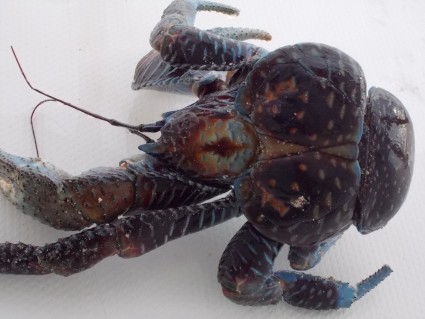
It all started in the South Coast of Rangiroa when we noticed two isolated motus full of coconut trees. The plan was then formed to go there at night with our head lamps and try to catch coconut crabs while they are out on the hunt.
They live inland in the ground but do go out of their holes at night to drink seawater and eat coconuts. The women on board decided not to join but the men had no such hesitation and Zach and I took our canoe and went crab hunting at 10 pm in pitch darkness without any moon in sight. We hit a couple of invisible coral heads on the way but managed to find our target Motu and started the hunt. We first discovered that crabs were not really hanging around on the beach but were well hidden inside the tree line. We could hear the big noise of their claws attacking the coconuts but could not see them at all. On the other hand, we were quite successful at finding mosquitoes and particularly the blood thirsty nonos, these tiny mosquitoes which sting you now but the pain and the itching only come the day after. Zach was particularly targeted and Raphaelle counted 67 bites on his body the day after.
After 20 minutes of unsuccessful search for crabs, we saw a light and a kayak coming at us. It turned out to be a young man living on a neighbouring Motu for a few months at a time to collect coprah. His parents come once a month to bring supplies, so he was curious to see what was behind those lights he could see on our Motu. His name was Tepuarii but we decided to call him Jerome, not to look like 17th century colonialist discoverers but because his grandma called him so. When he realised how useless I was at hunting, he kindly decided to take the lead and show us the way. In the following hour, we proudly found five crabs of very decent size and beautiful colours, blue, purple and red, with one solely discovered by Zach. Colour is actually the way to see them among the dense green vegetation. Jerome was also very careful to look at the trees to make sure we wouldn't be attacked from the top as theses delicious creatures are pretty powerful. Catching them proved hard as they resisted very bravely and put on a good fight to stay on their Motu.
Tying them is an art that we clearly did not master and, again, Jerome, very patiently taught us how to do it: you actually gather the legs together above their body, leaving the powerful claws hanging below. Efficient technique but not entirely bite proof as I soon realised when one managed to make a big cut on my little finger with his massive claw. We said good bye and a huge thank you to Jerome and got back to our boat past midnight tied and soaked as a squall surprised us on the way. We put the crabs in a bucket with a cover and a huge weight on it, dried ourselves and finally went to bed.
Two hours later, I was awakened by Tule who did not seem too thrilled that the deck seemed alive with the sound of an army parade.They had kicked the bucket (only literally unfortunately) and were freely roaming around the cockpit as they were smart enough to know that jumping in the water would drown them. And the hunt resumed....not a funny occupation at 3 in the morning. They fought again hard for their life but after 20 minutes of hand to hand fighting, they were back in the bucket. The deck was filthy and needed a good scrub and I was finally back to bed at four. The morning after, my cut was massively painful and I had a good proper infection. It was time to head back to Rangiroa's main village. We "bathed" Zach in tea tree oil to ease his bite pains and I started to take antibiotics to cure the infection.
Which leads me back to the main story, how to cook the gracious coconut crabs? Well, you just boil and eat the bastards!!
They live inland in the ground but do go out of their holes at night to drink seawater and eat coconuts. The women on board decided not to join but the men had no such hesitation and Zach and I took our canoe and went crab hunting at 10 pm in pitch darkness without any moon in sight. We hit a couple of invisible coral heads on the way but managed to find our target Motu and started the hunt. We first discovered that crabs were not really hanging around on the beach but were well hidden inside the tree line. We could hear the big noise of their claws attacking the coconuts but could not see them at all. On the other hand, we were quite successful at finding mosquitoes and particularly the blood thirsty nonos, these tiny mosquitoes which sting you now but the pain and the itching only come the day after. Zach was particularly targeted and Raphaelle counted 67 bites on his body the day after.
After 20 minutes of unsuccessful search for crabs, we saw a light and a kayak coming at us. It turned out to be a young man living on a neighbouring Motu for a few months at a time to collect coprah. His parents come once a month to bring supplies, so he was curious to see what was behind those lights he could see on our Motu. His name was Tepuarii but we decided to call him Jerome, not to look like 17th century colonialist discoverers but because his grandma called him so. When he realised how useless I was at hunting, he kindly decided to take the lead and show us the way. In the following hour, we proudly found five crabs of very decent size and beautiful colours, blue, purple and red, with one solely discovered by Zach. Colour is actually the way to see them among the dense green vegetation. Jerome was also very careful to look at the trees to make sure we wouldn't be attacked from the top as theses delicious creatures are pretty powerful. Catching them proved hard as they resisted very bravely and put on a good fight to stay on their Motu.
Tying them is an art that we clearly did not master and, again, Jerome, very patiently taught us how to do it: you actually gather the legs together above their body, leaving the powerful claws hanging below. Efficient technique but not entirely bite proof as I soon realised when one managed to make a big cut on my little finger with his massive claw. We said good bye and a huge thank you to Jerome and got back to our boat past midnight tied and soaked as a squall surprised us on the way. We put the crabs in a bucket with a cover and a huge weight on it, dried ourselves and finally went to bed.
Two hours later, I was awakened by Tule who did not seem too thrilled that the deck seemed alive with the sound of an army parade.They had kicked the bucket (only literally unfortunately) and were freely roaming around the cockpit as they were smart enough to know that jumping in the water would drown them. And the hunt resumed....not a funny occupation at 3 in the morning. They fought again hard for their life but after 20 minutes of hand to hand fighting, they were back in the bucket. The deck was filthy and needed a good scrub and I was finally back to bed at four. The morning after, my cut was massively painful and I had a good proper infection. It was time to head back to Rangiroa's main village. We "bathed" Zach in tea tree oil to ease his bite pains and I started to take antibiotics to cure the infection.
Which leads me back to the main story, how to cook the gracious coconut crabs? Well, you just boil and eat the bastards!!
Natural food
21 June 2014
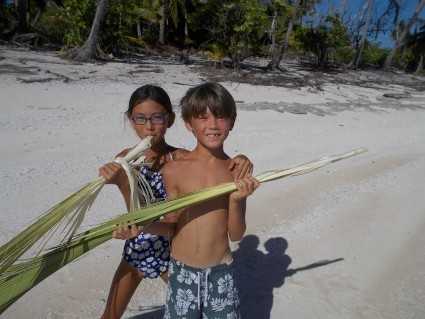
Eating hearts of palm trees
Fare Coco
21 June 2014
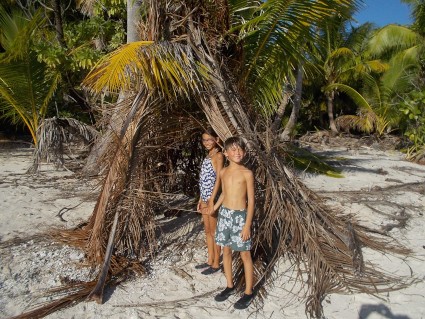
Fare coco
| Vessel Name: | Sailing Magne |
| Hailing Port: | Raiatea |
| Crew: | Zach, Raphaelle, Tule & Didier |
Gallery not available
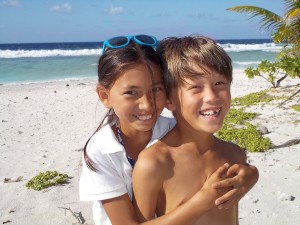
Who: Zach, Raphaelle, Tule & Didier
Port: Raiatea